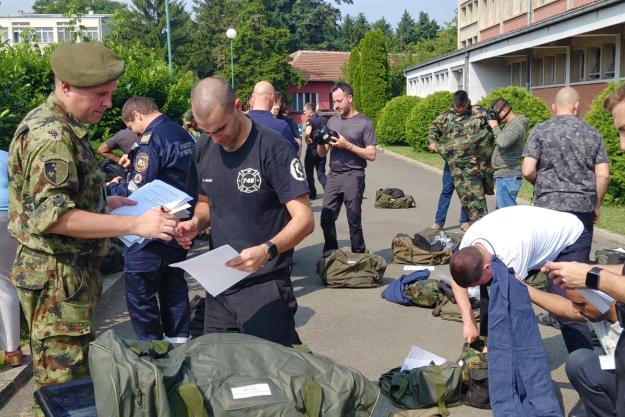
Participants during the 13th International Basic Course on Assistance and Protection in Kruševac, Serbia
THE HAGUE, Netherlands — 26 June 2019 — A group of 25 first responders, trainers and emergency managers from the States Parties of the Chemical Weapons Convention (CWC) built their professional capabilities during the 13th International Basic Course on Assistance and Protection in Kruševac, Serbia, from 17-21 June.
Comprehensive training, held at the CBRN Centre of the Serbian Armed Forces Training Command, familiarised participants with means of personal protection. They also gained hands-on practice with Detection, Identification and Monitoring (DIM), as well as sampling and quick rescue operations.
Acting Director of the International Cooperation and Assistance Division at the Organisation for the Prohibition of Chemical Weapons (OPCW), Mr Shawn DeCaluwe, noted: “The OPCW Technical Secretariat has long benefited from CBRN Centre’s institutional knowledge and we hope to avail that knowledge to the Organisation’s Member States through courses like this for years to come.”
This initial offering in the International Assistance and Protection Training Cycle will carry forward to the Advanced Course in Islamabad, Pakistan, in November.
The Basic Course was attended by participants from Algeria, Argentina, Bangladesh, Bosnia and Herzegovina, Bulgaria, Italy, Peru, Philippines, Saudi Arabia, Sri Lanka, Tunisia, Uganda, and Ukraine.
Background
The International Basic Course on Assistance and Protection, offered by the Republic of Serbia as a mechanism for exchanging material and scientific and technological information concerning the means of protection against chemical weapons, has been an enduring component of the OPCW Technical Secretariat’s annual capacity building programme.
As the implementing body for the Chemical Weapons Convention, the OPCW, with its 193 Member States, oversees the global endeavour to permanently eliminate chemical weapons. Since the Convention’s entry into force in 1997, it is the most successful disarmament treaty eliminating an entire class of weapons of mass destruction.
Over 97% of all chemical weapon stockpiles declared by possessor States have been destroyed under OPCW verification. For its extensive efforts in eliminating chemical weapons, the OPCW received the 2013 Nobel Peace Prize.
